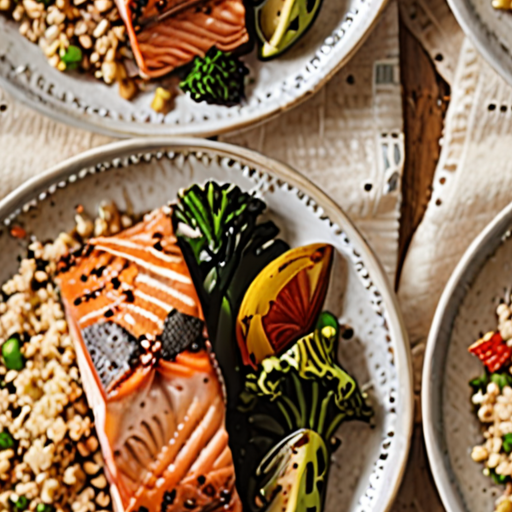As athletes strive to reach their peak performance, they often overlook one crucial aspect of their training regimen: nutrition. A well-planned diet can significantly impact athletic performance, providing the necessary fuel for optimal energy levels, recovery, and overall health. However, with the abundance of conflicting information available, it can be challenging for athletes to determine what constitutes the perfect diet for their unique needs.
The Perfect Diet for an Athlete
A well-planned diet is crucial for athletes to perform at their best and recover quickly between workouts.
- Macronutrient Balance
- Carbohydrates provide energy for high-intensity activities, such as sprinting and weightlifting.
- Proteins aid in muscle repair and growth, making them essential for athletes who engage in strength training.
- Fats support hormone production and provide sustained energy.
- Hydration
- Drink plenty of water before, during, and after exercise.
- Eat hydrating foods, such as watermelon and cucumbers, to supplement fluid intake.
- Nutrient-Dense Foods
- Fruits, such as berries and citrus fruits, which are rich in antioxidants and vitamins.
- Leafy greens, like spinach and kale, which provide essential minerals and fiber.
- Lean proteins, including poultry, fish, and legumes, which support muscle growth and repair.
- Whole grains, such as brown rice and quinoa, which offer sustained energy and fiber.
- Meal Frequency and Timing
- Eat a balanced meal 1-3 hours before exercise to fuel performance.
- Consume a post-workout snack or meal within 30-60 minutes after exercise to aid in recovery.
- Individualized Nutrition Plans
- Consult with a registered dietitian or sports nutritionist to develop a personalized nutrition plan.
- Monitor progress and adjust the plan as needed to optimize performance and overall health.
- Supplements and Additives
- Consult with a healthcare professional before adding any supplements or additives to the diet.
- Choose reputable brands and products that meet quality standards.
An ideal diet for athletes should consist of a balance of macronutrients, including carbohydrates, proteins, and fats.
Athletes need to stay hydrated to perform optimally and prevent dehydration-related illnesses.
Athletes should focus on consuming nutrient-dense foods, including:
Athletes should aim to eat smaller, frequent meals to maintain energy levels and support muscle recovery.
Athletes may require customized nutrition plans based on their specific needs, dietary restrictions, and performance goals.
Athletes may consider adding supplements and additives to their diet to enhance performance and support recovery.
What is a 50 25 25 Meal Plan?
A 50 25 25 meal plan is a balanced diet consisting of 50% carbohydrates, 25% protein, and 25% healthy fats.
- This macronutrient split has been shown to promote optimal health and performance for athletes and individuals looking to manage their weight.
- The high carbohydrate intake provides energy for intense workouts and daily activities, while the moderate protein consumption supports muscle growth and repair.
- The inclusion of healthy fats ensures that the body receives essential vitamins and minerals necessary for overall well-being.
Benefits of a 50 25 25 Meal Plan
- Improved endurance and performance during exercise
- Enhanced muscle recovery and growth
- Weight management and maintenance
- Reduced risk of chronic diseases, such as heart disease and diabetes
Sample 50 25 25 Meal Plan
- Breakfast: Overnight oats with banana, almond milk, and walnuts (400 calories, 60g carbs, 20g protein, 15g fat)
- Lunch: Grilled chicken breast with quinoa and steamed vegetables (500 calories, 30g carbs, 40g protein, 10g fat)
- Dinner: Baked salmon with sweet potato and green beans (550 calories, 40g carbs, 35g protein, 20g fat)
- Snack: Apple slices with peanut butter (150 calories, 20g carbs, 8g protein, 8g fat)
Tips for Implementing a 50 25 25 Meal Plan
- Consult with a registered dietitian or healthcare professional to determine individual calorie needs and macronutrient requirements.
- Focus on whole, unprocessed foods, such as fruits, vegetables, lean proteins, and whole grains.
- Stay hydrated by drinking plenty of water throughout the day.
- Be mindful of portion sizes and adjust as needed to meet individual calorie needs.
What is an Athlete Meal Plan?
A well-planned athlete meal plan is essential for optimal performance and recovery during physical activity.
-
Macronutrient Balance
An athlete meal plan should consist of a balance of carbohydrates, protein, and healthy fats to provide energy, support muscle growth and repair, and aid in recovery.
- Carbohydrates: 55-65% of daily calories
- Protein: 15-20% of daily calories
- Healthy Fats: 20-25% of daily calories
-
Hydration
Adequate hydration is crucial for athletes to perform at their best and recover quickly.
- Aim to drink at least 8-10 glasses of water per day
- Monitor urine color to ensure adequate hydration
-
Meal Frequency and Timing
Athletes should aim to eat 5-6 meals per day, spaced out every 2-3 hours, to maintain energy levels and support muscle growth and repair.
- Breakfast: Within 30 minutes of waking up
- Post-workout snack: Within 30-60 minutes of exercise
- Lunch: 2-3 hours after breakfast
- Pre-workout snack: 1-2 hours before exercise
- Dinner: 2-3 hours after lunch
- Before bed snack: 1-2 hours before sleep
-
Nutrient-Dense Foods
Athletes should focus on consuming nutrient-dense foods, including:
- Fruits: Berries, citrus fruits, apples
- Vegetables: Leafy greens, broccoli, bell peppers
- Protein sources: Lean meats, fish, eggs, dairy
- Whole grains: Brown rice, quinoa, whole wheat bread
- Healthy fats: Nuts, seeds, avocados
-
Supplements
Athletes may consider adding supplements to their diet to support performance and recovery, including:
- Protein powder
- Branched-chain amino acids (BCAAs)
- Electrolyte tablets or powders
Remember to consult with a registered dietitian or healthcare professional to develop a personalized athlete meal plan that meets your specific needs and goals.
The 5:2 Diet for Athletes
The 5:2 diet is a type of intermittent fasting regimen that involves restricting calorie intake for two non-consecutive days of the week.
- This approach can be beneficial for athletes who want to improve their overall health and performance while still allowing for flexibility in their eating habits.
- During the restricted days, athletes typically consume between 500-600 calories, which can help promote weight loss, improve insulin sensitivity, and enhance fat burning.
- In contrast, the remaining five days of the week allow for normal eating patterns, enabling athletes to replenish energy stores and support muscle growth and repair.
- Some benefits of the 5:2 diet for athletes include improved endurance, increased fat oxidation, and enhanced mental clarity.
- However, it’s essential to note that individual results may vary, and athletes should consult with a healthcare professional before implementing any new diet or fasting regimen.
Key Considerations for Athletes
When adopting the 5:2 diet, athletes should consider the following factors:
- Caloric needs: Athletes require adequate caloric intake to support energy production, muscle growth, and recovery.
- Nutrient balance: A balanced diet that includes protein, complex carbohydrates, and healthy fats is crucial for optimal performance and overall health.
- Hydration: Adequate hydration is essential for physical performance and overall health, particularly during periods of restricted calorie intake.
- Electrolyte balance: Athletes should pay attention to electrolyte levels, particularly sodium, potassium, and magnesium, to prevent imbalances and associated symptoms.
Sample Meal Plan
A sample meal plan for the 5:2 diet might look like this:
- Day 1 (restricted): Breakfast – 200 calories (e.g., oatmeal with fruit), Lunch – 150 calories (e.g., grilled chicken breast with vegetables), Dinner – 250 calories (e.g., salmon with quinoa and steamed broccoli)
- Day 2 (normal eating): Breakfast – 400 calories (e.g., scrambled eggs with whole-grain toast and avocado), Lunch – 600 calories (e.g., grilled turkey burger with sweet potato fries), Dinner – 800 calories (e.g., roasted chicken with brown rice and mixed vegetables)
Conclusion
The 5:2 diet can be a valuable tool for athletes looking to improve their overall health and performance while still allowing for flexibility in their eating habits.
By considering key factors such as caloric needs, nutrient balance, hydration, and electrolyte balance, athletes can optimize their diet and reap the benefits of the 5:2 diet.
What Do Most Athletes Eat for Breakfast?
A typical healthy breakfast for athletes will contain a carb source such as fruit and vegetables, whole grain cereal such as porridge or muesli, and rye bread.
- Carb sources can include:
- Fruit such as bananas, berries, and citrus fruits
- Vegetables like spinach, broccoli, and bell peppers
- Whole grain cereals like oatmeal, quinoa, and brown rice
- Rye bread and whole wheat toast
Proteins and natural fats will be derived from:
- Eggs, nuts, cheese, yoghurt, milk, and meat
- Nuts and seeds like almonds, walnuts, chia seeds, and flaxseeds
- Fatty fish like salmon and tuna
- Lean meats like chicken, turkey, and beef
Nutrition for athletes includes eating right and staying hydrated.
Key Components of an Athlete’s Breakfast
An athlete’s breakfast should include a balance of carbohydrates, protein, and healthy fats to provide energy and support muscle recovery.
- Complex carbohydrates for sustained energy
- Protein to repair and rebuild muscles
- Healthy fats for heart health and satiety
Examples of Athlete-Friendly Breakfast Options
Some examples of athlete-friendly breakfast options include:
- Oatmeal with banana, almond butter, and honey
- Scrambled eggs with whole wheat toast and avocado
- Greek yoghurt with berries, granola, and walnuts
- Smoothie bowl with spinach, banana, protein powder, and almond milk
Importance of Hydration
Staying hydrated is crucial for athletes, especially during intense physical activity.
Athletes should aim to drink at least eight glasses of water per day, and consider incorporating electrolyte-rich beverages like coconut water or sports drinks during long workouts.
Conclusion is Not Required
What Does Tom Brady Eat in a Day?
The Tom Brady diet has gained significant attention due to its association with improved physical performance and overall health.
- The diet primarily consists of 80% plant-based foods, including vegetables, whole grains, and legumes
- The remaining 20% comprises lean meats, fish, and poultry
- Certain fruits, protein powders, protein bars, nuts, and seeds are also part of the diet
As an athlete, I understand the importance of fueling my body with the right nutrients to optimize performance and recovery.
- Focusing on whole, unprocessed foods helps me maintain a balanced diet and reduces the risk of chronic diseases
- Incorporating a variety of colorful vegetables into my meals provides essential vitamins, minerals, and antioxidants
- Lean proteins, such as chicken and fish, support muscle growth and repair
While the Tom Brady diet may seem restrictive, it emphasizes the importance of mindful eating and portion control.
By prioritizing nutrient-dense foods and limiting processed and high-calorie items, I can maintain a healthy weight and support optimal physical function.
Nutrient-Dense Foods:
- Leafy greens, such as spinach and kale
- Cruciferous vegetables, like broccoli and cauliflower
- Fatty fish, including salmon and tuna
- Legumes, such as lentils and chickpeas
Hydration:
Staying hydrated is crucial for physical performance and overall health.
I aim to drink at least eight glasses of water per day, and limit my intake of sugary drinks and caffeine.
Conclusion:
A well-balanced diet, combined with regular exercise and adequate hydration, is essential for achieving optimal physical performance and overall health.
By incorporating the principles of the Tom Brady diet into my daily routine, I can support my athletic goals and maintain a healthy lifestyle.





0 Comments